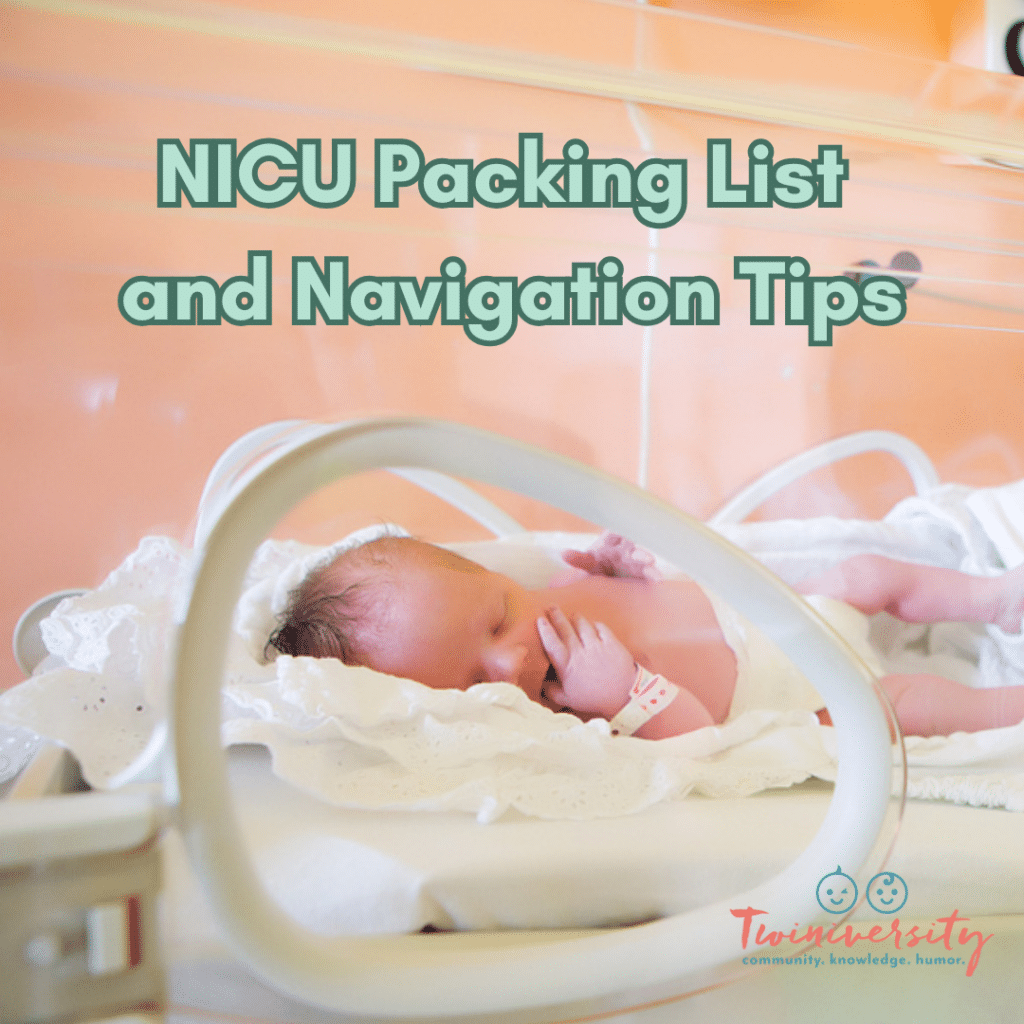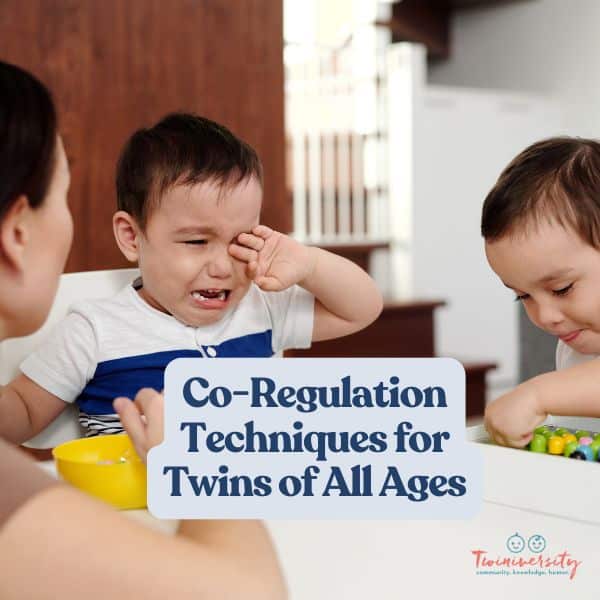Last updated on December 9th, 2024 at 11:56 pm
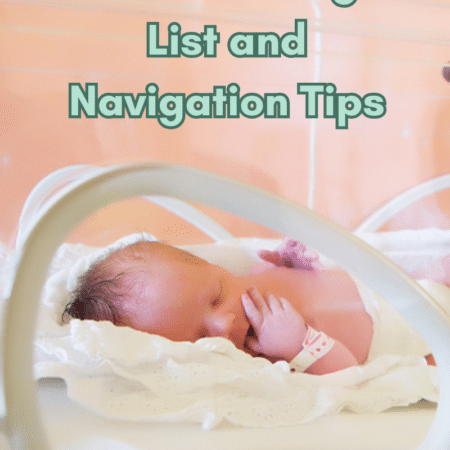
Despite your best efforts to deliver full term twins (or more), there is a chance your babies may be delivered prematurely. If they are born prematurely, there’s also a good chance there will be a Neonatal Intensive Care Unit (NICU) stay. If you find yourself dealing with a long NICU stint, here are a few tips to make it go as smoothly as possible.
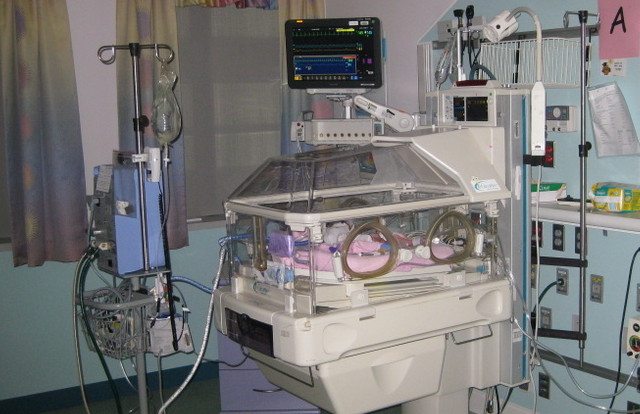
1. Become an active participant in your baby’s care ASAP
Shortly after birth, preemies are usually placed in isolettes, which look like clear plastic boxes with portholes that allow caregivers to access them.
Depending on your babies’ needs, it could be days, or even weeks before you can hold them. Furthermore, preemies in the NICU are often attached to a variety of monitors or IV’s. It can feel extremely intimidating to say the least. Seeing your baby in this sort of environment can make bonding extremely difficult.
However, you are the parent and you should feel empowered to participate in your baby’s care. At first, your baby may be extremely fragile and unable to tolerate much interaction. But talk to the nurses and your baby’s care team to see how you can safely touch or hold them.
If touch isn’t possible yet, keep in mind that your baby can hear you speak or sing. The NICU nurses can also teach you how to perform the “cares.” This can involve swabbing the baby’s mouth, changing diapers, checking their body temperature, and moving their pulse ox (oxygen monitor) from one foot to the other every few hours. Being able to do even these small things can help you bond with your baby and make them feel like yours.
2. Don’t be afraid to ask questions
Being in a hospital in general, let alone the NICU, can be intimidating. Medical professionals often toss technical jargon around as if you are a medical school graduate, leaving you confused and frustrated.
Don’t feel ashamed to ask for clarification or alternative explanations. As the parent, it is important to know what is happening with your baby’s care. This is especially important so you can make the most informed decisions around what’s best for your child.
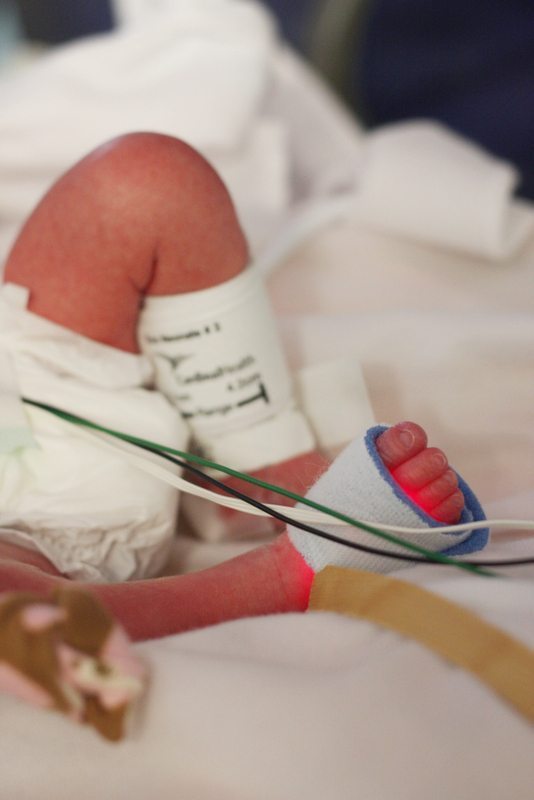
3. Bond with the NICU staff
Most hospitals assign “primary nurses” to patients admitted long-term. These are nurses who agree to tend to particular patients every time they are on shift. Primary nurses often become imperative team members in the care of your baby.
They learn each baby’s nuances, cheer for them, and advocate for their needs. They can also share their knowledge regarding how to care for a preemie. After all, a day will come when you are responsible for your baby’s care.
It’s also vital that when you leave the NICU that you feel confident in your baby’s care. Don’t forget, primary care nurses work hard for their patients, so it never hurts to show appreciation with a favorite snack or treat.
4. Take time for yourself and your partner
When your baby is in the NICU, it’s all too easy to get into a routine of staying at the hospital for hours on end, only going home to shower and sleep. While spending time with your baby is important, your mental and emotional health are equally important.
Take some time for yourself to do things you enjoyed doing before the NICU. Consider having a date night, eating dinner out, shopping, or whatever you find relaxing. Thankfully, NICU life does not last forever and remembering who you were before is imperative.
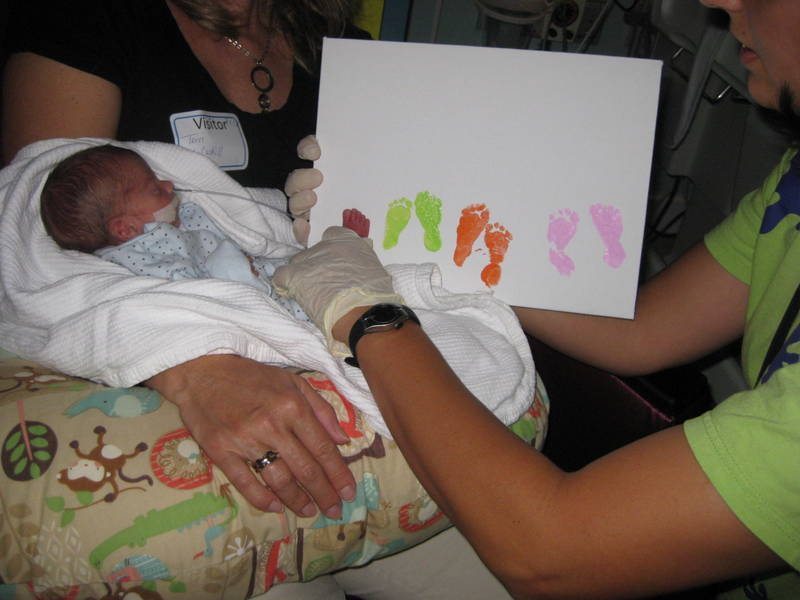
5. Meet with your social worker
Most NICUs will connect you with a hospital social worker. These folks have a wealth of knowledge regarding resources you may need from basic needs (e.g. multiple birth formula programs, social security income) to mental health needs.
NICU life can be stressful, and social workers can help alleviate some of that stress for you. If your NICU stay has already begun, and you haven’t met with a social worker yet, be encouraged to ask for one.
6. Welcome visitors
The NICU is a place where emotions are high, and being there alone can be distressing. Many NICUs allow a few visitors per day (though of course be sure to check your NICU’s policy, especially post-COVID-19).
Even brief visits from a friend or family member can brighten your day and lessen your stress levels. If your NICU has strict visitor policies, consider meeting friends and family in common areas such as the cafeteria for lunch or a quick coffee break.
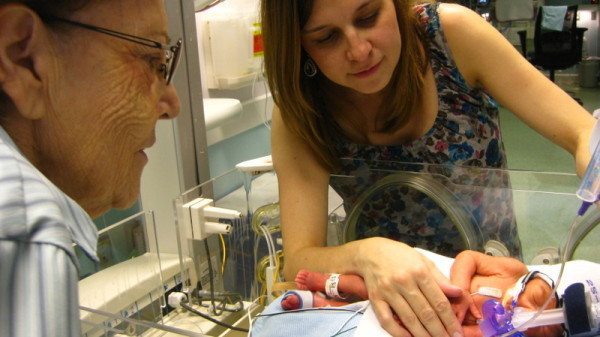
7. Capture memories
Even though time in the NICU can be tense and emotionally charged, don’t forget to celebrate the beginning of your baby’s life. Take as many pictures and videos as possible, documenting your baby’s growth and accomplishments.
When the NICU days are long behind you, you will appreciate looking at how far your baby has come. In fact, your baby will someday appreciate seeing how tiny they once were! In addition to photos and videos, stamp your baby’s hands and feet. They will never be so tiny again, and you’ll create something to cherish forever.
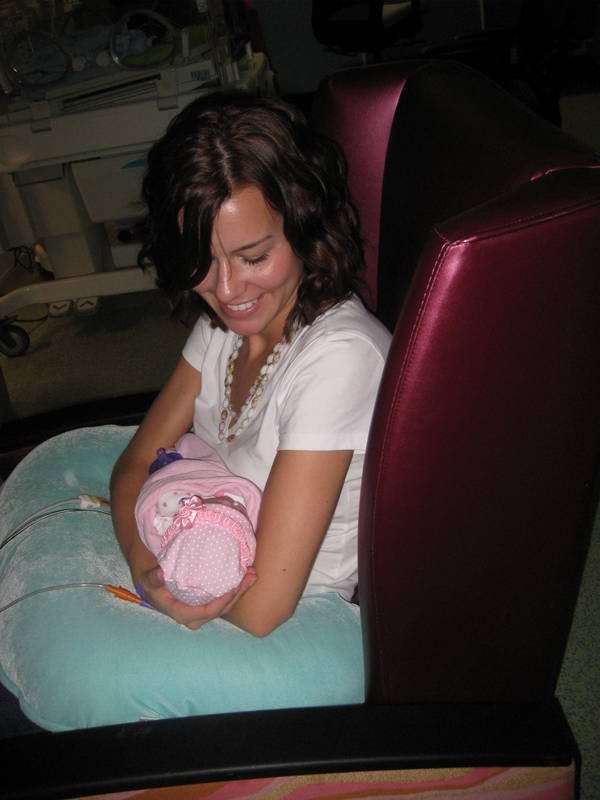
8. Find someone who can relate
Whether you find an online support group or one right at your hospital, it is immensely helpful to communicate with others that understand your plight, especially if you have multiple preemies.
Many hospitals employ child life specialists who help families connect through group meetings and activities. Just like with any trying experience, knowing you aren’t alone is always a good thing. If you’ve got a local Moms of Multiples club, join them and let them know your situation so they can hook you up ASAP with some support!
The Twiniversity membership is a great place to connect with parents of multiples from all over the world to ask questions and get support.

Need some twin parent friends? Get the support you need with a Twiniversity Membership. Benefits include a monthly twin parent club meeting on Zoom, access to a private Facebook group just for twin parents, and a video library of twin parenting lessons. Visit Twiniversity.com/membership to join today!
9. Bring items from home
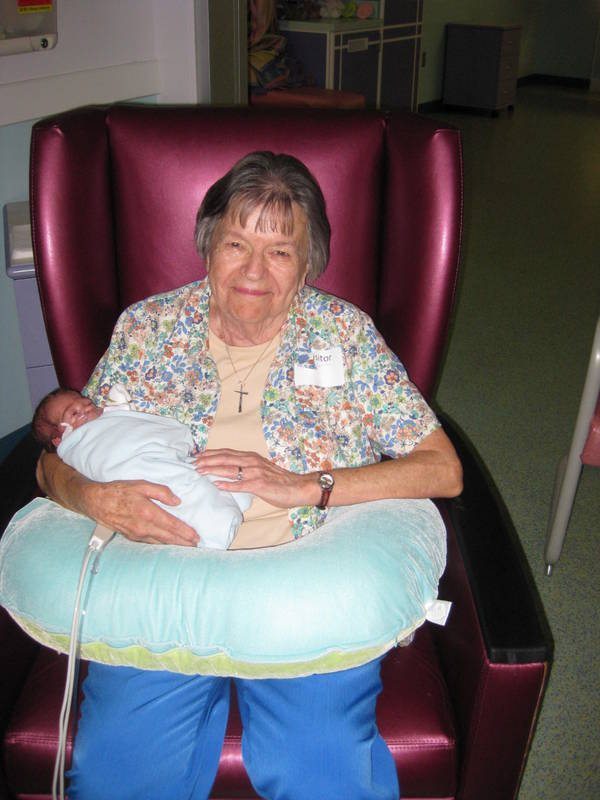
Many NICUs provide basic amenities such as preemie clothing, baby wash, and breast pumps. However, bringing your own creature comforts from home can help make your stay a bit more pleasant.
Personalizing your baby’s space with name plates and pictures can help you feel more at home and bonded with your baby as well.
Below are items you may find helpful during your stay:
NICU Packing List
Notepad and pen– This allows you to jot notes about what doctors and nurses say, and to keep track of questions that arise.
Pillow and blanket – If you are recovering from delivery, you may need to rest at your baby’s beside, and will want to be comfortable with your own pillow and blanket.
Insulated cup with lid and straw – If you are pumping, you will need to stay hydrated and most NICUs allow drinks with lids in the room. The Contigo cup with straw is a great one!
Boppy pillows and spare covers – These help facilitate breastfeeding if you are attempting to nurse. If you aren’t nursing, a Boppy can help you (or visitors) hold fragile babies more securely.
Robe – A comfortable robe will help when you practice kangaroo care (skin-to-skin contact between parent and baby) while also maintaining modesty.
Nursing cover – If you are pumping, you may want to pump at your baby’s bedside, or need to pump in a lactation room where others are present. Nursing covers help you maintain privacy.
Lanolin – If you are pumping, lanolin nipple cream will be your best friend, enough said.
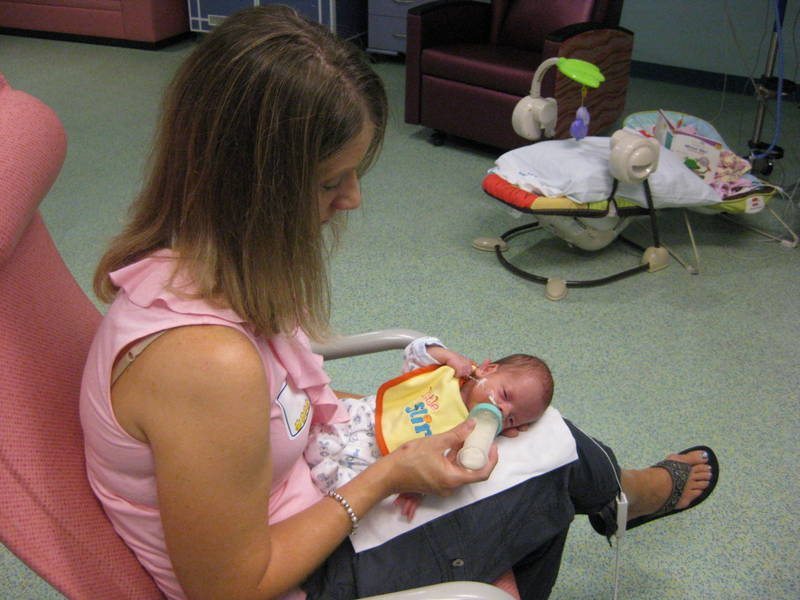
Change of clothes – Babies are messy creatures, and if you find yourself covered in a mess, you’ll want to change.
Stain remover – Again, babies are messy. If your baby makes a mess on a visitor or a small mess on you, stain remover will be welcomed.
Toiletries – If you find yourself needing to room in with your baby, or are there for an extended period of time, small toiletries such as toothbrushes and facial soap will be appreciated.
Breast pads and pantyliners – New moms, even those who can’t pump or nurse, leak a lot and having spares of these are handy.
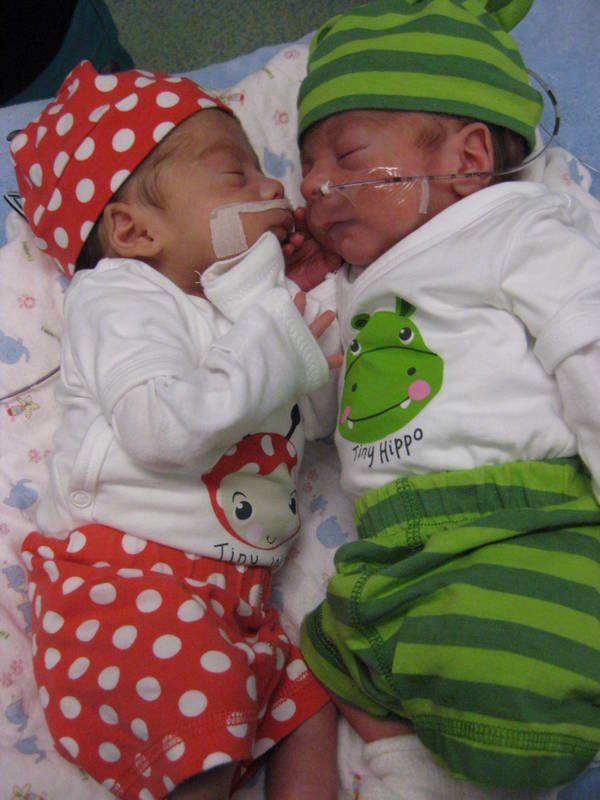
Baby lotion – When your baby is strong enough, baby massage is a great way to connect and relax your baby. We love the Dr. Brown’s Baby Balm for this purpose.
Nail clippers/ nail file – Nail clipping is considered cosmetic to hospitals so unless you clip your baby’s nails they will become sharp and long. Check out the ZoLi Buzz B electric nail file for babies.
Books/ high contrast pictures – Even the tiniest of babies appreciate items of visual interest. Can you imagine staring at a blank wall for days on end? Check out this high contrast baby book from Manhattan Toy.
Camera – Inexpensive digital or disposable cameras can be left with your baby, and you can ask staff to snap pictures when you are away.
Baby clothes – Most NICUs provide preemie sized clothes for babies who can regulate temperature. However, as a parent it feels good to dress your baby in his own clothes, especially if you receive any as gifts or want to buy a few favorites.
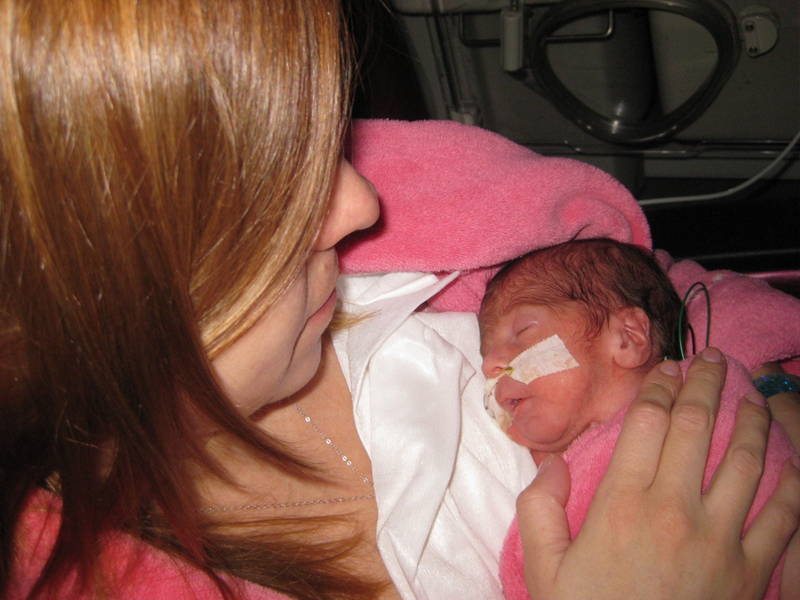
Laundry bag – If you decide to bring your own clothes, you’ll unfortunately have to wash them. A laundry bag will help with transport.
Bottles – Before your baby can come home, he’ll have to prove himself capable of finishing bottles. The hospital provides small bottles, but you’ll want to make sure he can manage the kind you have at home too. You may find that you need to try several before finding the right bottle for your baby. We recommend the Dr. Brown’s Preemie bottle with preemie nipples.
Bottle Brush – If you bring bottles to the NICU, you’ll have to clean them as well. A bottle brush is handy for quick cleanings.
Click here to download a PDF of the NICU PACKING LIST!
Want to read more about the NICU? Check out these articles too!
- A NICU Story: When Your Twins Are an Hour Away
- The Stress of Having One Twin in the NICU
- Bedrest, NICU and Love
- From the NICU to Home
- Caring for Parents with NICU Babies

Amber Shawver and her husband, George, are the proud parents of girl-boy-girl-boy quadruplets who debuted in 2012. Amber draws from her experiences working in childcare settings and as a school based behavioral consultant to manage raising quadruplets at home. Amber continues to practice school psychology part-time in an urban school district. She chronicles life raising quadruplets at Four to Adore. You can also find her on Facebook, Pinterest, and Twitter.
Are You a New Twin Parent?
Check out Natalie Diaz’s book:
“What To Do When You’re Having Two
The Twin Survival Guide From Pregnancy Through the First Year”
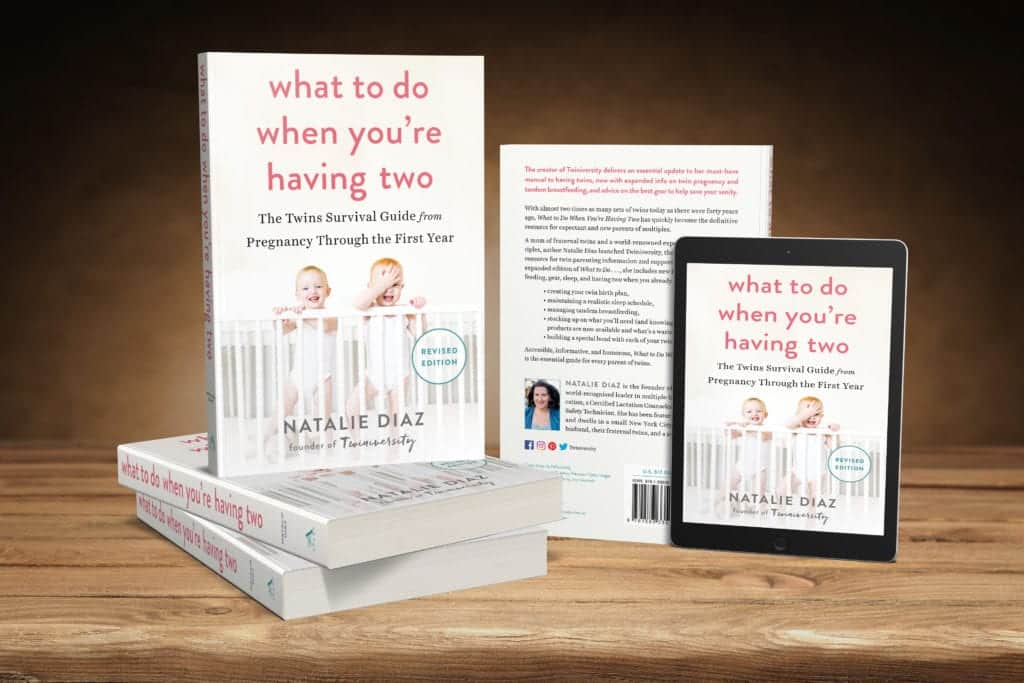
In What to Do When You’re Having Two: The Twins Survival Guide from Pregnancy Through the First Year, national twins guru and founder of Twiniversity (and twin mom herself!) Natalie Diaz provides a no-holds-barred resource about life with twins, from pregnancy and birth all the way through your duo’s first year of life.
Accessible and informative, What to Do When You’re Having Two
is the must-have manual for all parents of twins.

